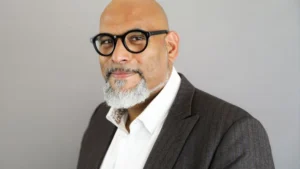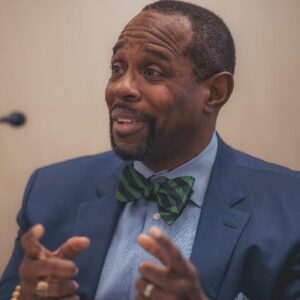Inclusion takes teamwork. Colleagues need to support one another, lift each other up, act as allies.
The problem is that “most people have never been on a team. They’ve been on a group of elite individuals,” according to John Amaechi, founder and chief executive officer of strategic consultancy APS Intelligence.
Amaechi, who is a best-selling author, organizational psychologist and former NBA player, spoke during a fireside chat with Leroy Nunery II, founder and principal of consulting firm PlūsUltré LLC and president of Evolution Advisors LLC, during the IICF Inclusion in Insurance Forum last June.
Amaechi said that he’s only been on two teams in his career. “I was on many units, but I was on two teams.” There’s a different feeling when you’re on a team, he added. “Effort seemed rewarded in ways that it wasn’t when a part of an elite group. It seemed like credit was shared, blame was distributed. Everybody knew that they had a part in the outcomes. Selfishness seemed to disappear in the face of a larger goal.”
A team is more than just a group of people working near each other, he said. They have to truly work with each other. They need to know each other’s strengths and weaknesses, their skills. They need to know what knowledge and abilities their teammates bring to the table beyond their assigned roles or job descriptions.
“Teams are incredibly effortful,” Amaechi noted. “You don’t just throw a group of people together who happen to be individually brilliant and imagine some magic will occur. It doesn’t. The reason most people have never been on a team is because of how continuously, onerously, forever effortful it is…Teaming is a perpetual state of calculated selflessness.”
 “Teaming is a perpetual state of calculated selflessness.”
“Teaming is a perpetual state of calculated selflessness.”
John Amaechi, APS Intelligence
When you’re truly part of a team, you aren’t focused only on your own goals or targets, he said. You’re also keeping an eye on your teammates, ready to help before someone needs it. He compared it to basketball, where you aren’t just defending [against] your own guy [on the opposing team], but you’re also being vigilant and helping the other players on your team. “And you don’t come late; you don’t help out after it’s already almost over,” Amaechi said. “You are there before any mistake is made. And this is what teams do.”
“But to do that, you’ve got to know people,” he said. “That’s the inclusion part. That’s the bit where if you are just perfunctory job titles, operating in proximity to each other, there’s no opportunity for an exploration, for curiosity about who a person is and what they can offer.” Without that curiosity, you won’t learn what other skills an individual can contribute to the team, he said.
Create a Safe Space
Nunery admitted that inclusion is very personal for him as a Black executive, “having always been an ‘other’—the only one in the room.”
He noted that in many organizations—particularly in the insurance industry—there’s an underrepresentation when it comes to race, gender, sexual orientation, ethnicity, religion. He said that “so many people tell me, ‘I don’t feel like I can bring my whole self; that even if I want to be a member of that team and want to contribute fully, I’m not allowed to.'”
That’s where the challenge is, Amaechi said. “I don’t know what responsible person—especially a psychologist—could tell an individual to disclose without full knowledge of the fact that their disclosure will be met with respect, dignity, care, empathy.”
 “So many people tell me, ‘I don’t feel like I can bring my whole self; that even if I want to be a member of that team and want to contribute fully, I’m not allowed to.'”
“So many people tell me, ‘I don’t feel like I can bring my whole self; that even if I want to be a member of that team and want to contribute fully, I’m not allowed to.'”
Leroy Nunery, PlūsUltré LLC
And it’s not only about protected categories. Maybe they’ve never disclosed that they didn’t go to college, or that they grew up in another country or the “wrong” side of town. “Nobody brings their most precious stuff to a place where they think it’s going to get beat up. Nobody does that,” he stated.
It’s important to create a culture and environment of psychological safety, Amaechi said. People need to feel safe enough to disclose what they have to offer beyond their job descriptions. “That’s why inclusion has always been and will always be about performance to me,” he added. “Yes, it’s also about human dignity. I don’t want to lose sight of that. But it’s been about human dignity for the last several hundred years, and we haven’t made the progress we needed to. So, let’s focus on the fact that it’s actually about winning through disruption.”
Being more inclusive can be about simple things, Amaechi said, such as knowing how to correctly pronounce your colleague’s name. If it isn’t obvious, ask. And once you ask, remember. You have a “window for being clumsy about stuff,” he said. But that window only lasts so long. You shouldn’t still be mispronouncing someone’s name two months later.
He also noted the importance of learning how to speak to colleagues who are Black, who are women, who are disabled. And if you don’t know, ask or look it up, he said.
Leadership Investment Is Critical
Amaechi noted the importance of measuring inclusion efforts, such as conducting pay gap audits for ethnicity, gender, disability; measuring differential attrition rates—women vs. men, ethnic minorities vs. not; analyzing engagement scores for different groups of people within the organization.
However, “the fundamental truth is that most organizations do not invest in HR and people systems that give them the granularity of data they need,” he said.
“I think there’s a paucity of leadership out there,” Amaechi said. “And I’m not talking about named leadership, because leadership is not a title; it is not a role. Leadership is a promise…that you will push people to deliver and develop but never break them.”
“Incongruence is intolerable,” he said, noting that most people do not like friends, colleagues or organizations that promise one thing and deliver something else.





















 Focus on Ski Guides After Deadly California Avalanche Could Lead to Criminal Charges, Civil Suits
Focus on Ski Guides After Deadly California Avalanche Could Lead to Criminal Charges, Civil Suits  State Farm Inked $1.5B Underwriting Profit for 2025; HO Loss Persists
State Farm Inked $1.5B Underwriting Profit for 2025; HO Loss Persists  Telematics and Trust: How Usage-Based Insurance Is Transforming Auto Coverage
Telematics and Trust: How Usage-Based Insurance Is Transforming Auto Coverage  State Farm Mutual to Pay $5B Dividend to Auto Insurance Customers
State Farm Mutual to Pay $5B Dividend to Auto Insurance Customers 





